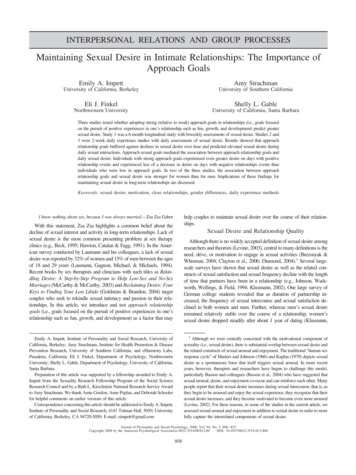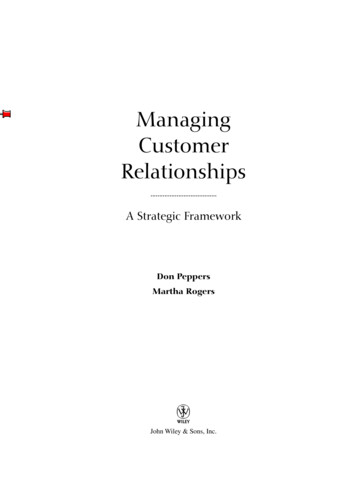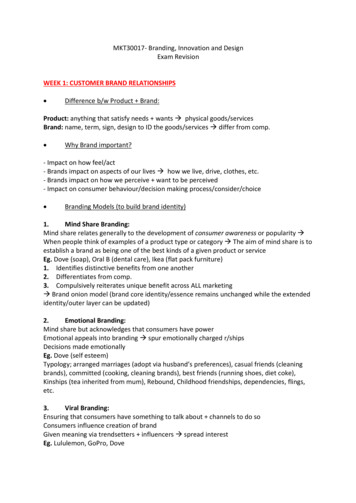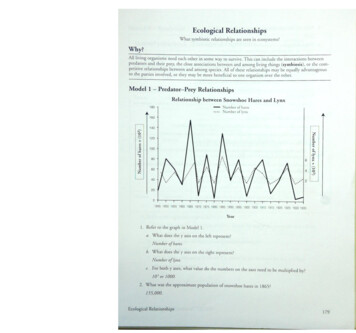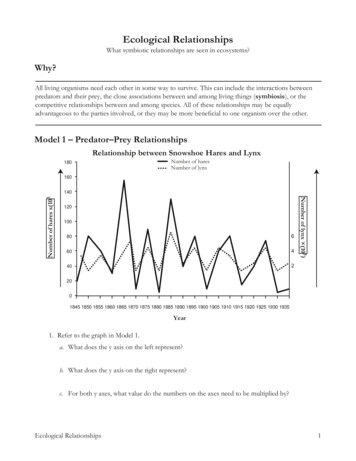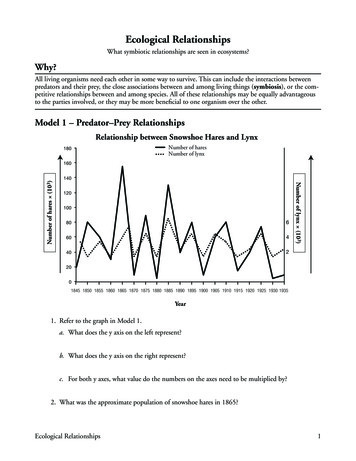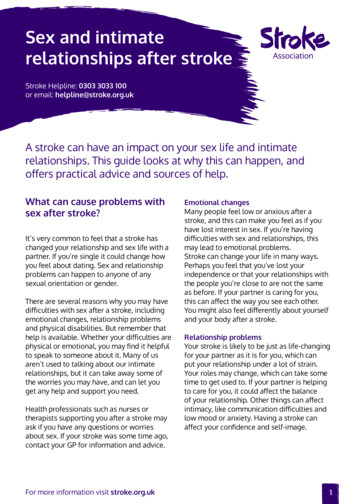
Transcription
Sex and intimaterelationships after strokeStroke Helpline: 0303 3033 100or email: helpline@stroke.org.ukA stroke can have an impact on your sex life and intimaterelationships. This guide looks at why this can happen, andoffers practical advice and sources of help.What can cause problems withsex after stroke?It’s very common to feel that a stroke haschanged your relationship and sex life with apartner. If you’re single it could change howyou feel about dating. Sex and relationshipproblems can happen to anyone of anysexual orientation or gender.There are several reasons why you may havedifficulties with sex after a stroke, includingemotional changes, relationship problemsand physical disabilities. But remember thathelp is available. Whether your difficulties arephysical or emotional, you may find it helpfulto speak to someone about it. Many of usaren’t used to talking about our intimaterelationships, but it can take away some ofthe worries you may have, and can let youget any help and support you need.Health professionals such as nurses ortherapists supporting you after a stroke mayask if you have any questions or worriesabout sex. If your stroke was some time ago,contact your GP for information and advice.For more information visit stroke.org.ukEmotional changesMany people feel low or anxious after astroke, and this can make you feel as if youhave lost interest in sex. If you’re havingdifficulties with sex and relationships, thismay lead to emotional problems.Stroke can change your life in many ways.Perhaps you feel that you’ve lost yourindependence or that your relationships withthe people you’re close to are not the sameas before. If your partner is caring for you,this can affect the way you see each other.You might also feel differently about yourselfand your body after a stroke.Relationship problemsYour stroke is likely to be just as life-changingfor your partner as it is for you, which canput your relationship under a lot of strain.Your roles may change, which can take sometime to get used to. If your partner is helpingto care for you, it could affect the balanceof your relationship. Other things can affectintimacy, like communication difficulties andlow mood or anxiety. Having a stroke canaffect your confidence and self-image.1
Sex and intimate relationships after strokeYou may both find it difficult to talk abouthow you feel, because you think you should‘stay strong’ for your partner. But if youdon’t discuss your feelings, tension andresentment can build up between you both.It may be that one of you would like to havesex, while the other has lost interest in it. Thiscould become a source of tension if it is notresolved. Openly discussing your feelings,listening to each other, and recognising howyou both feel is the first step in sustaining apositive, healthy relationship.If you are single, a stroke can sometimespose difficulties if you are looking for anew relationship. For example, it can betough if you have problems with mobilityor communication difficulties. A stroke canaffect your confidence and self-esteem,which can also make it harder to talk topeople. However, many people establishhappy, healthy relationships after a stroke.2Physical problems Muscle weakness or spasticity (musclestiffness) may restrict how you move andhow you can position yourself during sex.Spasticity can cause pain which couldaffect your enjoyment of sex. Changes to sensation like numbness canmake you less sensitive to touch, or youmight experience painful sensations likepins and needles. Tiredness and fatigue are very commonproblems after stroke. If your stroke hasaffected your mobility, simple daily taskscan be more tiring than they used to.Fatigue means tiredness that does notget better with rest, and is a commoncondition for stroke survivors. Tirednessand fatigue can make it harder for youto do many of the activities you used toenjoy, including sex. Continence problems may be a sourceof worry or embarrassment, and you mayavoid sex because of it. Catheters cancause practical difficulties when havingsex as well. Hormone imbalances can sometimes bedue to a stroke, leading to a wide rangeof problems including difficulty gettingan erection in men or low sexual desire inwomen. This can happen when a strokeaffects the parts of your brain that areimportant for controlling hormones. Other medical conditions (such asdiabetes, epilepsy or heart disease)and the medication you take for themcan make it difficult for men to get anerection or reach orgasm, and can alsolower sexual desire and reduce vaginallubrication in women.Call the Stroke Helpline on 0303 3033 100
Sex and intimate relationships after strokeCan sex cause a stroke?Some people avoid sex because of a fearthat it will cause another stroke. While it istrue that your blood pressure can rise whenyou orgasm, you’re no more likely to have astroke during sex than at any other time.If you had a haemorrhagic stroke (bleeding onthe brain) due to a burst aneurysm, and youfeel worried that sex could trigger anotherbleed, contact your GP or stroke specialistnurse for advice. If an aneurysm and any otherrisk factors like high blood pressure have beentreated, this risk should be very small.Whatever the cause of your stroke, you canvisit your GP to ask for help with reducingyour risk of another stroke.Behaviour changesA stroke can damage parts of the brainthat are linked to the emotions, leading toproblems with controlling emotions. Somepeople have difficulty controlling their mood,and seem angry or irritable, which can put astrain on relationships.Some people find that they become moresexual, or lose inhibitions. They mightbehave and talk differently, such as talking tosomeone about sex when it’s not appropriate.If people close to you say they are worriedabout your behaviour, try to be open to whatthey say, and remember that they care aboutyou. It could be difficult to talk about for bothof you, but it can help to discuss ways ofdealing with it. For instance, if you agree thatyou sometimes act inappropriately, youcould make an agreement with your lovedones about what to do when it happens.For example, you could agree on a signalto make you aware, and let you take a minuteto think.For more information visit stroke.org.ukThink about your own safety. In particularif you choose to access sexual services orpornography, this might put you at risk orhave an impact on your relationships andfinancial situation.Contact your GP, who should be able to offeradvice and refer you to a specialist for help ifneeded. Read our information on behaviourchanges after stroke on stroke.org.uk.What can help sexual problems?This guide can only give generalinformation. You should always getindividual advice about your own healthand any treatment you may need froma medical professional such as a GP,pharmacist or nurse. You can accessemotional support through your GP, or bycontacting a psychology professional suchas a counsellor.The first step in dealing with any problem isto talk about it. This isn’t always easy, andyou may find it difficult or embarrassing totalk about things like a lack of desire or notbeing able to get an erection. However, thesekinds of problems can affect anyone at anytime, not only people who have had a stroke.Talking and being open about your feelingscan help your relationships, and mightalso help in dealing with sexual problems.Many people want advice about sex andrelationships after a stroke, and there is helpand information available.It’s also important to look after yourself. Tryto have an active, healthy lifestyle, includingeating a healthy diet and being as active aspossible for you. This can help improve youroverall health, as well as your sexual andemotional wellbeing.3
Sex and intimate relationships after strokeHelp with emotional changesGet help with low mood or depressionIf you’re feeling low or depressed, your GPcan refer you to local services such as talkingtherapies and cognitive behavioural therapy(CBT). Talking therapy gives you time andspace to talk about difficult feelings with atrained therapist.The GP can talk to you about whether antidepressant medication may help. Somemedications can cause loss of interest in sexas a side effect, but you may be able to trydifferent types to find what works best for you.Tell your GP or pharmacist if you experienceany problems. Don’t use over-the-counteror herbal remedies without speaking toyour pharmacist, as they can cause adversereactions with other medication.Reduce anxiety about sexFew people feel like having sex when theyare tense and anxious, so it’s worth givingyourself time to get in the mood beforehand.Choose a time when you and your partner areboth relaxed and can be sure you won’t beinterrupted. Showing affection to each otheris really important. Every couple has theirown way of doing it, but you could try hugs,running a bath for your partner or simplygiving them a compliment.You might feel as if a lot has changed aboutyou and your body, and masturbation canhelp you learn about how your body nowresponds to sexual feelings. You can do it byyourself or with a partner, and it can be justas fulfilling as other kinds of sexual activity.Help with relationship problemsTalk about your feelingsTalk to your partner about the things you’refinding difficult, and try to work out whatyou could both do to make things easier. Tellthem how you are feeling, and listen to whatthey want to say. Try reading and talkingabout this guide together.You may feel awkward about bringing upthe subject of sex, but having an honestconversation about what you are findingdifficult is the first step to making changes.Set aside a time to talk when you won’t beinterrupted, and choose a place where youboth feel comfortable. Sometimes it’s easierto talk about sex away from the bedroom,so neither of you feels under pressure.Take it in turns to talk and listen carefully toeach other.Above all, remember that sex is not aperformance. You don’t have to ‘succeed’or achieve a ‘goal’, and it doesn’t alwayshappen perfectly every time.Remember there are various ways to expressyour feelings and be close to another person.You could start by getting to know yourpartner physically again without attemptingto reach orgasm. Most people get pleasurefrom touching, kissing, cuddling andmassage.4Call the Stroke Helpline on 0303 3033 100
Sex and intimate relationships after strokeTips for having conversationsYou and your partner might disagree aboutthings and with the stress of stroke, you mayfind you are arguing more than you used to.Whatever you and your partner are feeling isok. Stroke can turn lives upside down and it’sbound to take time to adjust. The followingtips can help. Pick your time. Try to make time forconversations when you are both fairlyrelaxed. Try to say ‘I’ rather than ‘you’. For example,saying ‘I would like it if you tried to talk tome more’ will probably be received muchbetter than ‘You never talk to me’. Try to acknowledge what the other personhas said by repeating it back to thembefore sharing your own point of view. Take a break if you need to.Enjoy time togetherIt doesn’t have to be all talking! Try spendingtime as a couple doing an activity you bothenjoy. If you can’t do the things you usedto do, this could be an opportunity to trysomething new together. Be creative. Itcan also be nice to remind each other whatbrought you together and what you reallylove about your partner.Your relationship might feel less like an equalpartnership sometimes. For example, if youalways used to take the bins out or organisefinances, but can’t anymore because of yourstroke, this may feel difficult for both ofyou. Talk to your partner and come up withsome ways you can both contribute to therelationship.For more information visit stroke.org.ukProfessional help with relationshipsTalking about your feelings is difficult,even with someone close to you, so it canoften help to get professional support.Relationship counselling can give you a safespace to find a way through the difficultiesyou’re facing.Single people can also go to relationshipcounsellors. If you’re in a couple, you canchoose to go alone or with your partner.Usually a counsellor will ask you questionsso that you, and your partner if you haveone, can talk about what’s going on and howyou feel.Sex therapy can help single people andcouples focus on the physical aspects ofrelationships. A sex therapist can help youwork out how to handle problems and finda solution that works for both of you. All thework you do with a therapist will be basedon talking, but they will be able to offeryou advice and suggest things for you totry at home. See ‘Other sources of help andinformation’ later in this guide for detailsof organisations that provide relationshipcounselling and sex therapy.If you have communication problemsthat make it hard for you to speak orunderstand speech, your speech andlanguage therapist can help you and yourpartner find a way to communicate witheach other. It can be difficult, but try to bepatient – things will get better with timeand you’ll find a way to say what you wantto each other.5
Sex and intimate relationships after strokeHelp with physical problemsErection problemsMuscle weakness or spasticitySome physical problems might make sexa bit less spontaneous but there are oftenpractical solutions to whatever problem youare having. If you have weakness down oneside or muscle stiffness, finding the rightposition for sex may be a case of trial anderror. That doesn’t have to be a bad thing.Think of it as an opportunity to explore whatyou can do in bed, including different ways ofdoing oral sex and masturbation.If you’re a man having problems getting ormaintaining an erection, it’s important totell your GP. Erection problems can be a signof health problems like heart disease, highblood pressure and diabetes. Your GP cantreat any underlying health conditions thatmay be causing your problems. Although itcan feel
Sex and intimate relationships after stroke For more information visit stroke.org.uk 5 Tips for having conversations You and your partner might disagree about things and with the stress of stroke, you may find you are arguing more than you used to. Whatever you and your partner are feeling is ok. Stroke can turn lives upside down and it’s bound to take time to adjust. The following tips can .
